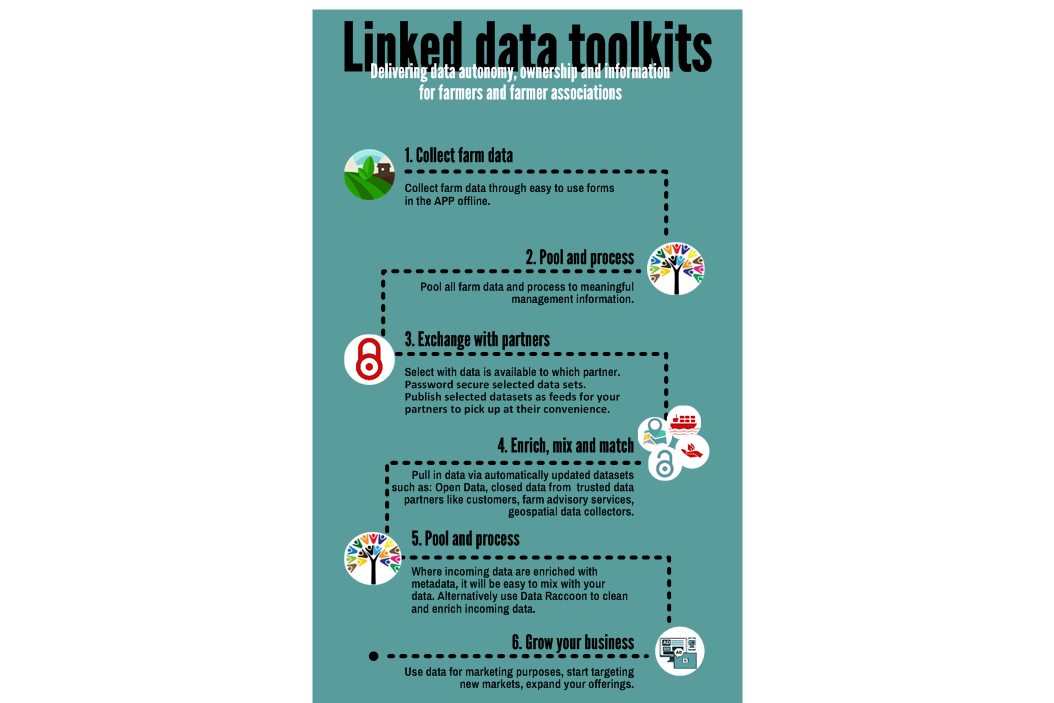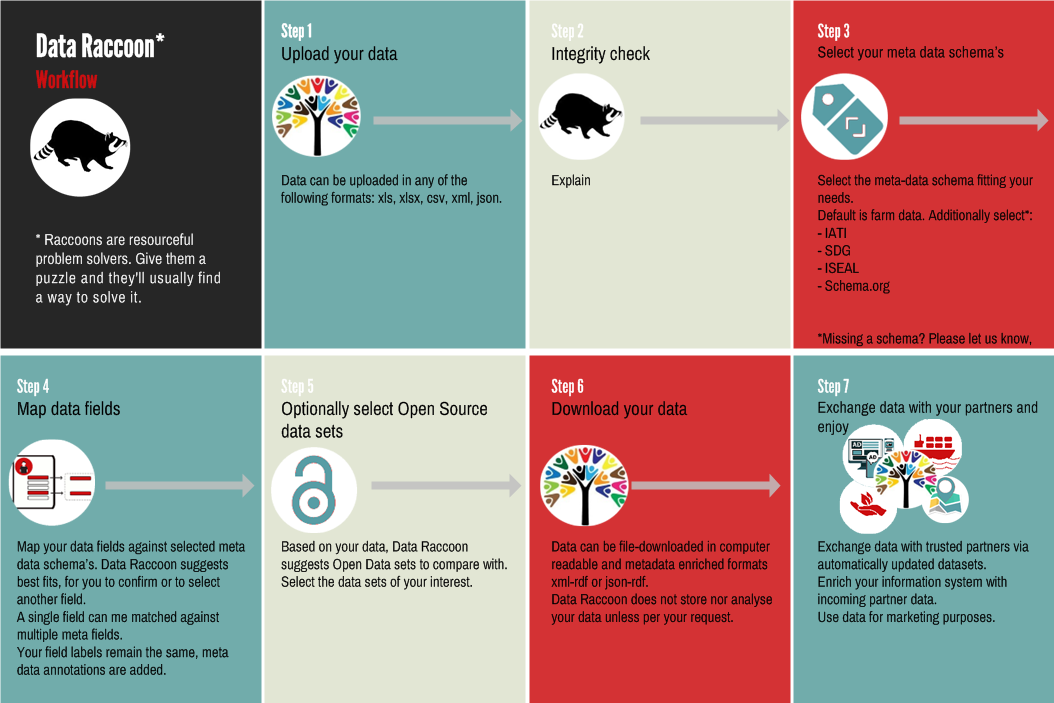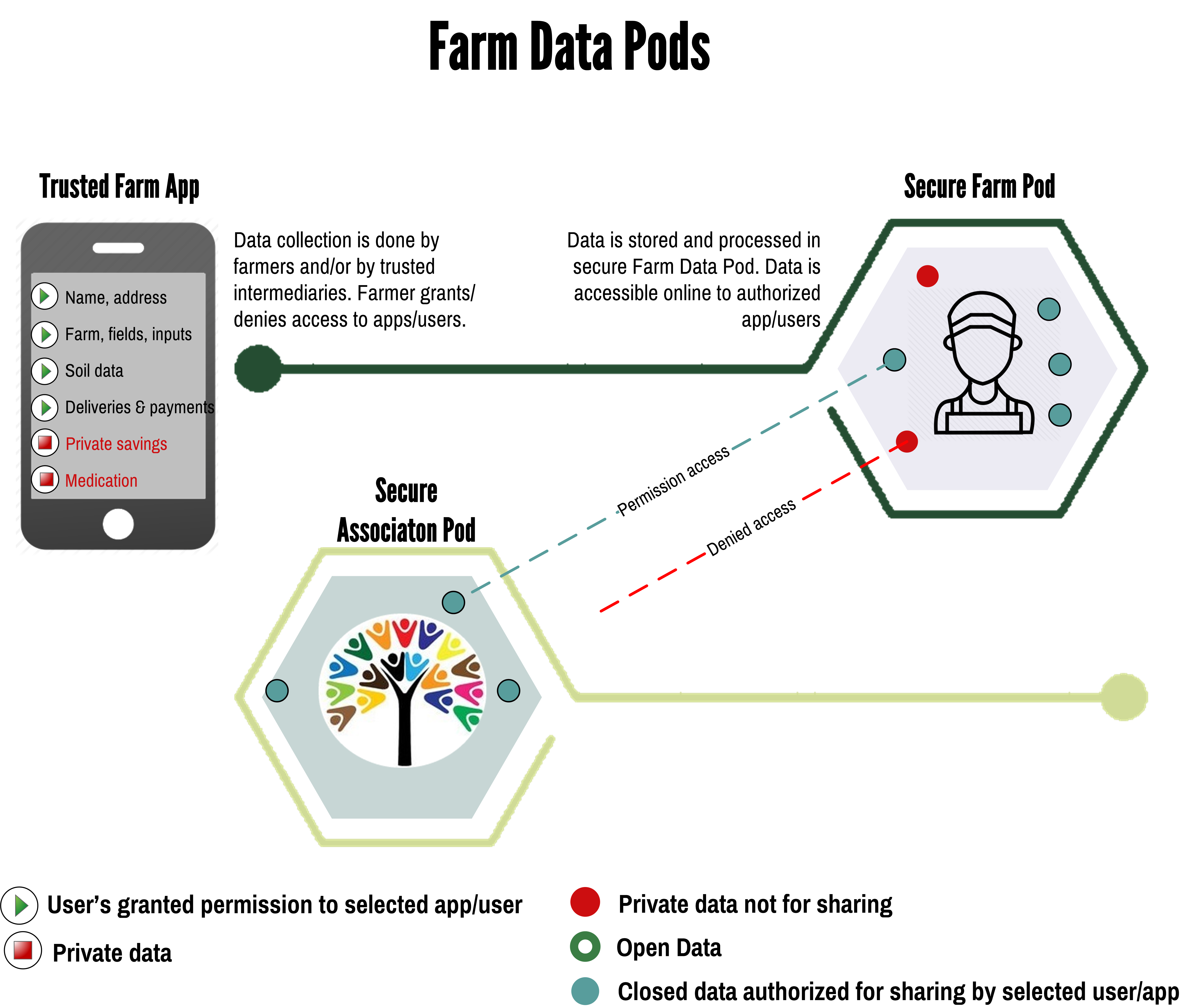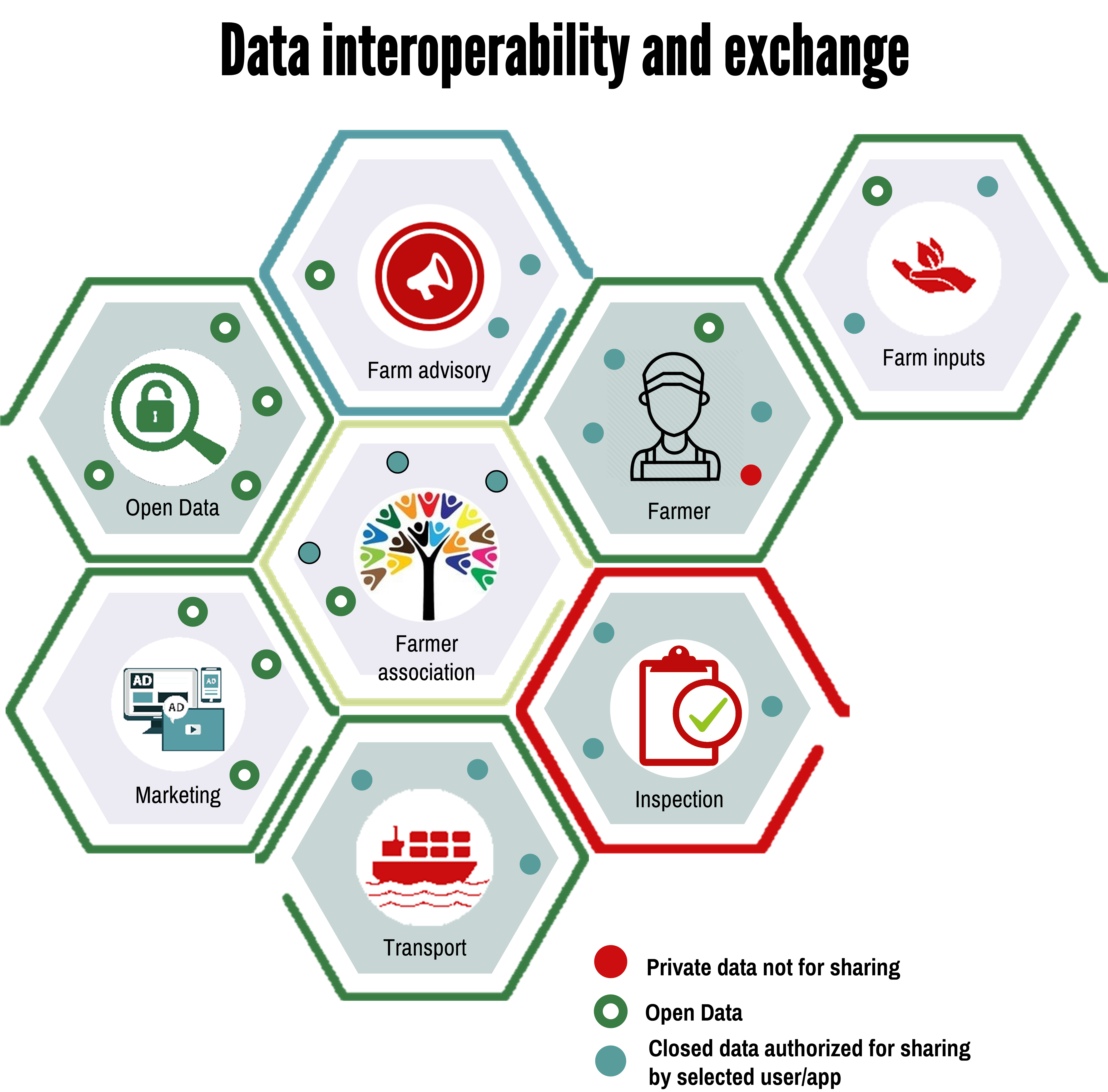Data quality
Validation suggestions will based on Natural Language Processing (NLP) and user- indicated field selections. Irregularities such as duplicates can be accepted/rejected and amended.
Enrich with Open Data
Data sets can be mapped and enriched with data classifications from frameworks such as IATI, Utz First Mile, industry specific tools or widely used schema such as Schema.org. The classification tool will allow for classifying data to match with Sustainable Development Goal indicators or with custom farm specific indicator sets. Classified data allows for combining own datasets with third party datasets, for instance with Open Data or datasets from peer organisations. This can help to compare the performance of farms or agricultural projects with similar initiatives.
Validation and data classification are the building blocks of interconnectivity and interoperability. This tool allows data operators to further process and exchange their datasets in computer readable formats xml and Json:
- datasets and visualisations can be published in detail or in aggregated form in an open environment, making it accessible to the general public or for specific target groups (accountability, credibility, sector progress);
- datasets will be file downloadable in meta-data supported and computer readable formats (xml or json). Dataset can be further processed in owner’s environment and/or shared via E-mail or other channels with data-operators (interoperability);
- datasets can be published online in a secure environment, allowing the data-owner to share an url from which the set can be accessed/downloaded by authorized data-operators. GET-request options included allowing the data-client to pull in data by date or theme (interoperability).
Data raccoon
An online service platform turning unstructured data into structured meta-data enriched machine-readible formats. Existing datasets from a wide variety of data management software can be uploaded, validated, classified and combined.
Validation
Validation suggestion will based on Natural Language Processing (NLP) and user- indicated field selections. Irregularities such as duplicates can be accepted/rejected and amended online or downloaded and locally amended.
It will also possible to validate using combined datasets and find overlapping project activities or certifications.
Validated data can be downloaded and processed locally, or further processed with tools Farm Data Pods.
Classification
Where schemas such as IATI or neutral alignment tools such as UTZ First Mile Farm Data exist, data operators should have the tools to enrich existing datasets with such data classifications:
- Data sets can be mapped and enriched with data classifications from frameworks such as IATI, Utz First Mile, industry specific tools and Schema.org, the latter being widely used by for instance Google and thousands of open source data providers;
- Data Raccoon allows for classifying data to match with Sustainable Development Goal indicators;
- Classification allows for data combinations as well as interconnectivity and interoperability, see Tool E.
Combination
Data Raccoon will suggest comparable third party datasets, such as for instance with Open Data or datasets from peer organisations. This can help to compare the performance of projects or businesses with similar initiatives.
Farm Data Pods
Farm Data Pods are decentralized datastores in which farmers and farm associations manage and visualize farm data. Data is owned by the farmer and can be provided to others at their request. Collection, registration and presentation of information can be done by the farmer or by intermediaries authorized by the farmer (service provider, extension officer, farm association).
Data interoperability and exchange
Data is being exchanged based on data reciprocity, with blockchain based techniques as carrier of reciprocity and data integrity. This will empower farmers and farmer organisations in data management while taking a proactive approach towards collecting, aggregating and sharing data with suppliers and customers.
- datasets and visualisations can be published in detail or in aggregated form in an open environment, making it accessible to the general public or for specific target groups (accountability, credibility, sector progress);
- datasets will be file downloadable in meta-data supported and computer readable formats (xml or json) allowing for interoperability.
- datasets can be published online in a secure environment, allowing the data-owner to share an url from which the set can be accessed/downloaded by authorized data-operators. GET-request options included allowing the data-client to pull in data by date or theme (interoperability).
For clients wishing to continue with their own managent systems, interoperability is offered as a service via Cooperative Knowledge's Data Raccoon in which clients publish their datasets from Data Raccoon's trusted server platform.
Blockchain
Farm Data Pods will be based on the open source technology of Solid. With a Farm Data Pod a farmer can decide where he/she stores farm data including production and location data, pictures, videos and contacts. This Farm Data Pod can be on a local computer at home or workplace or with an online provider of choice. The data owned by the farmers and can be moved at any time without interruption of service. A farmer van give business partners permission to to read or write to parts of the farmer POD. No more forms to be filled: business partners can read the details from your POD with your permission. Data added by a partner does not require downloading or syncing, the Farm Data Pod can be accessed from any place. It is a secure storage managed by the farmer him/herself. He/she decides who to get access to what.
Where the farmer data pod is designed for storing data and sharing data, the open source Hyper ledger Fabric Block chain is designed for creating secure commercial and efficient transactions and tracking and tracing. Difference with other block chain systems is that Hyperldger is permissioned and private and does not require high energy mining operations. (See also this article). “Permissioned” implies that not everyone can become a member, but members enroll through a “Membership Service provider” which can be seen as a set of rules governing and authentication of membership. Hyperledger Fabric also offers the possibility to create channels, allowing a group of members to create transactions that are only privately known to them and are registered only by the participants of the channel. This would also that competing value chains could make use of the same Hyper ledger, but using different channels. See also this video and this flow chart.
A normal CMS like Drupal will be used for storing non-critical information, making flexible information retrieval and presentation relatively simple.
Management dashboards
Patterns, trends and correlations that might go undetected in text-based data can be exposed and recognized easier with data visualization. The dashboarding toolbox will provide various flexible tools to create selections, filters and visualisations of selected data. Views, diagrams and graphs can be stored in management dashboards. Each user can develop and manage his own dashboards.
For clients wishing to continue with their own managent systems, management dashboards are offered at the Data Raccoon server platform. Obviously in a trusted environment to which only client authorised persons have access.
Bonsucro
The Sustainable Agriculture Network (SAN)
Better Cotton Initiative (BCI)
The Better Cotton Initiative (BCI) is a multi-stakeholder Standards System set up to make global cotton production better for the people who produce it, better for the environment it grows in and better for the sector’s future. Our four specific aims:
- Reduce the environmental impact of cotton production
- Improve livelihoods and economic development in cotton producing areas
- Improve commitment to and flow of Better Cotton throughout supply chain
- Ensure the credibility and sustainability of the Better Cotton Initiative
The International Trade Centre (ITC)
The International Trade Centre (ITC) (French: Centre du commerce international (CCI)) is a multilateral agency which has a joint mandate with the World Trade Organization (WTO) and the United Nations (UN) through the United Nations Conference on Trade and Development (UNCTAD).
Iseal Alliance
Roundtable on Sustainable Biomaterials (RSB)
A multi-stakeholder organisation committed to ensuring best practice in sustainable biomaterials.
The RSB has members from a worldwide movement of businesses, NGOs, academics, government and UN organisations that all have the same goal of supporting and driving best practice for sustainable biomaterial production.
We are a collaboration of more than 60 diverse organisations that have united to create the RSB. What was once a vision to ensure biofuel sustainability has grown into a global sustainability certification for all biomaterials.




